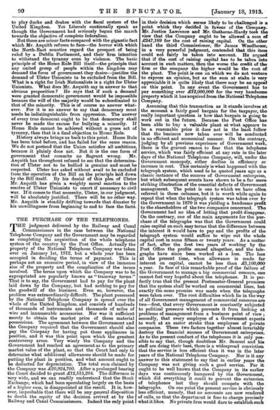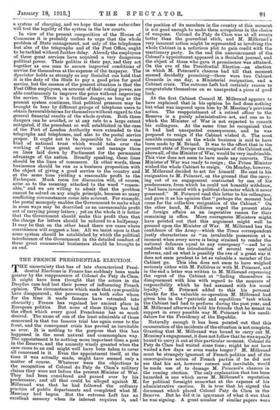THE PURCHASE OF THE TELEPHONES.
THE judgment delivered by the Railway and Canal
Commissioners in the case between the National Telephone Company and the Government may be regarded as completing the acquisition of the whole telephone system of the country by the Post Office. Actually the property of the National Telephone Company was taken over on January 1st, 1912, but a whole year has been occupied in deciding the terms of payment. This is perhaps not an excessive period, in view of the immense size of the property and the complication of the issues involved. The terms upon which the Company was to be expropriated are popularly known as "tramway terms." That is to say, the Government had to pay for the plant laid down by the Company, but had nothing to pay for the goodwill of the business. Even so, however, the problem was extraordinarily difficult. The plant possessed by the National Telephone Company is spread over the whole of the United Kingdom, and consists of hundreds of thousands of instruments and thousands of miles of wire and innumerable accessories. Nor was it sufficient merely to obtain the market price of these material possessions. The agreement between the Government and the Company required that the Government should also pay the Company for having put these appliances in position, and it was this point upon which the greatest controversy arose. Very wisely the Company and the Government had reached an agreement as to the primary market value of the plant, so that the Court had only to determine what additional allowances should be made for putting the plant in position, and what amount ought to be deducted for depreciation. The total sum claimed by the Company was £20,924,700. After a prolonged hearing the Court decided to grant £12,515,264. The difference is very wide, and we can readily understand that the Stock Exchange, which had been speculating largely on the basis of a higher sum, is disappointed at the result. It is, however, improbable that there will be any general disposition to doubt the equity of the decision arrived at by the Railway and Canal Commissioners. Indeed the only point in their decision which seems likely to be challenged is a point which they decided in favour of the Company.
Mr. Justice Lawrence and Mr. Gathorne-Hardy took the view that the Company ought to be allowed a sum of £247,189 for the cost of raising capital. On the other hand the third Commissioner, Sir James Woodhouse, in a very powerful judgment, contended that this item
could not fairly be taken into account. He argued that if the cost of raising capital has to be taken into account in such matters, then the worse the credit of the firm or the company the higher would be the cost of the plant. The point is one on which we do not venture to express an opinion, but as the sum at stake is very appreciable it is quite likely that there may be an appeal on this point. In any event the Government has to pay something over £12,000,000 for the very handsome property which it has acquired from the National Telephone Company.
Assuming that this transaction as it stands involves at the moment a fairly good bargain for the taxpayer, the really important question is how that bargain is going to work out in the future. Because the Post Office has been able to buy a valuable plant at what appears to be a reasonable price it does not in the least follow that the business now taken over will be conducted in an efficient and economical manner. On the contrary, judging by all previous experience of Government work, there is the gravest reason to fear that the telephone service, which was fairly efficient at any rate in the later days of the National Telephone Company, will, under the Government monopoly, either decline in efficiency or increase in cost. This certainly is what happened with the telegraph system, which used to be quoted years ago as a classic instance of the success of Government enterprise, but which subsequent events have shown to be a far more striking illustration of the essential defects of Government management. The point is one to which we have often referred in these columns, but it is worth while again to repeat that when the telegraph system was taken over by the Government in 1870 it was yielding a handsome profit to the shareholders of the two companies concerned. The Government had no idea of letting that profit disappear. On the contrary, one of the main arguments for the purchase of the telegraphs was that the Government could raise capital on such easy terms that the difference between the interest it would have to pay and the profits of the telegraph system would suffice to wipe out the whole capital cost in some fifteen or twenty years. As a matter of fact, after the first two years of working by the Post Office the profits ceased altogether, and the telegraphs have since been worked at a loss. The loss at the present time, when allowance is made for interest on capital, cannot be less than £1,100,000 a year. In face of this remarkable proof of the failure of the Government to manage a big commercial concern, one cannot feel very hopeful about the telephones. It is perfectly true that the present Postmaster-General promises that the system shall be worked on commercial lines, but exactly the same promise was made when the telegraphs were taken over. The root difficulties which lie in the wayof all Government management of commercial concerns are two—first, that every Government is constantly subjected to political pressure which prevents it from looking at problems of management from a business point of view ; secondly, that every employee of a Government expects to work at an easier stroke than employees of private companies. These two factors together almost invariably destroy the financial success of Government enterprises. As to the present conduct of the telephones it is only possible to say that, though doubtless Mr. Samuel and his staff are doing their best, there is a widespread conviction that the service is less efficient than it was in the later years of the National Telephone Company. Nor is it any answer to this statement to say that in earlier years the Company was not giving such a good service. For it ought to be well known that the Company in its earlier days was continuously hampered by the Government, which did everything it could to prevent the extension of telephones lest they should compete with the telegraphs. On one point the present service is obviously less efficient, namely, that no accounts are now rendered of calls, so that the department is free to charge precisely what it likes. No private firm would dare to establish such a system of charging, and we hope that some subscriber will test the legality of the system in the law courts.
In view of the present composition of the House of Commons it is probably useless to urge that the whole problem of State management, not only of the telephones but also of the telegraphs and of the Post Office, ought to be tackled without further delay. Already the employees of these great services have acquired a very dangerous political power. Their politics is their pay, and they act together as one man to secure improved conditions of service for themselves at the expense of the taxpayer. The Spectator holds as strongly as any Socialist can hold that it is the duty of the State to pay a good price for good service, but the essence of the present situation is that the Post Office employees, on account of their voting power, are able continuously to improve the price without improving the service. There is a further danger, as long as the present system continues, that political pressure may be brought to bear by different groups of telephone users to obtain favourableterms for themselves without regard to the general financial results of the whole system. Both these dangers can be avoided, or at any rate to a large extent mitigated, if the precedent so well established in the case of the Port of London Authority were extended to the telegraphs and telephones, and also to the postal service proper. It ought not to be impossible to devise some kind of national trust which would take over the working of these great services and manage them on lines laid down by Parliament for the permanent advantage of the nation. Broadly speaking, these lines should be the lines of commerce. In other words, these businesses should be run as a, business proposition with the object of giving a good service to the country and at the same time yielding a reasonable profit to the Exchequer. Much room for discussion will, of course, arise as to the meaning attached to the word "reasonable," and we are willing to admit that the problem cannot be solved on any single principle, because so many conflicting circumstances come into account. For example, the postal monopoly enables the Government to make what in some ways may be described as an unreasonable profit out of carrying penny letters ; yet on the whole it is better that the Government should make this profit than that the charge for letters should be reduced to a halfpenny. It may be that on the other hand there are cases where convenience will suggest a loss. All we insist upon is that some system should be established by which the political interference of the Government in the detailed conduct of these great commercial businesses should be brought to an end.







































 Previous page
Previous page